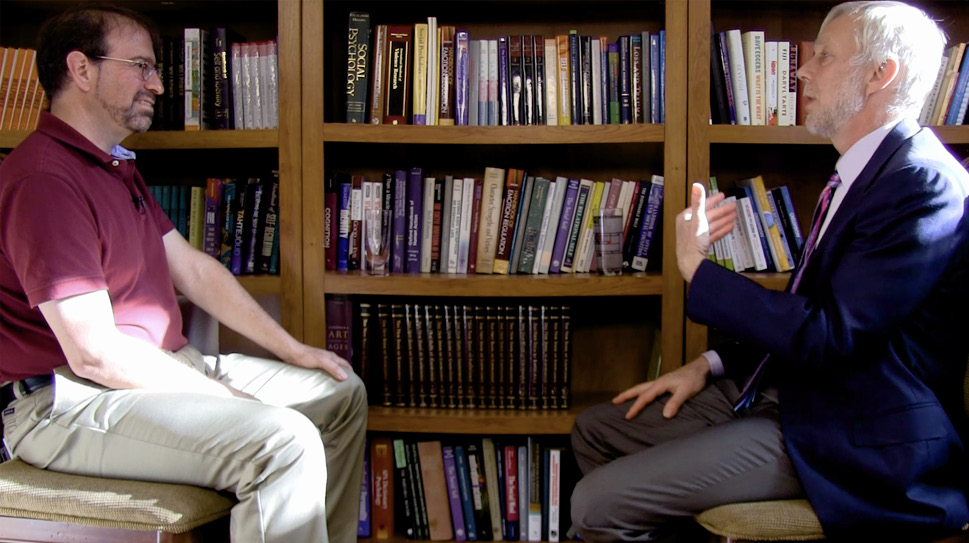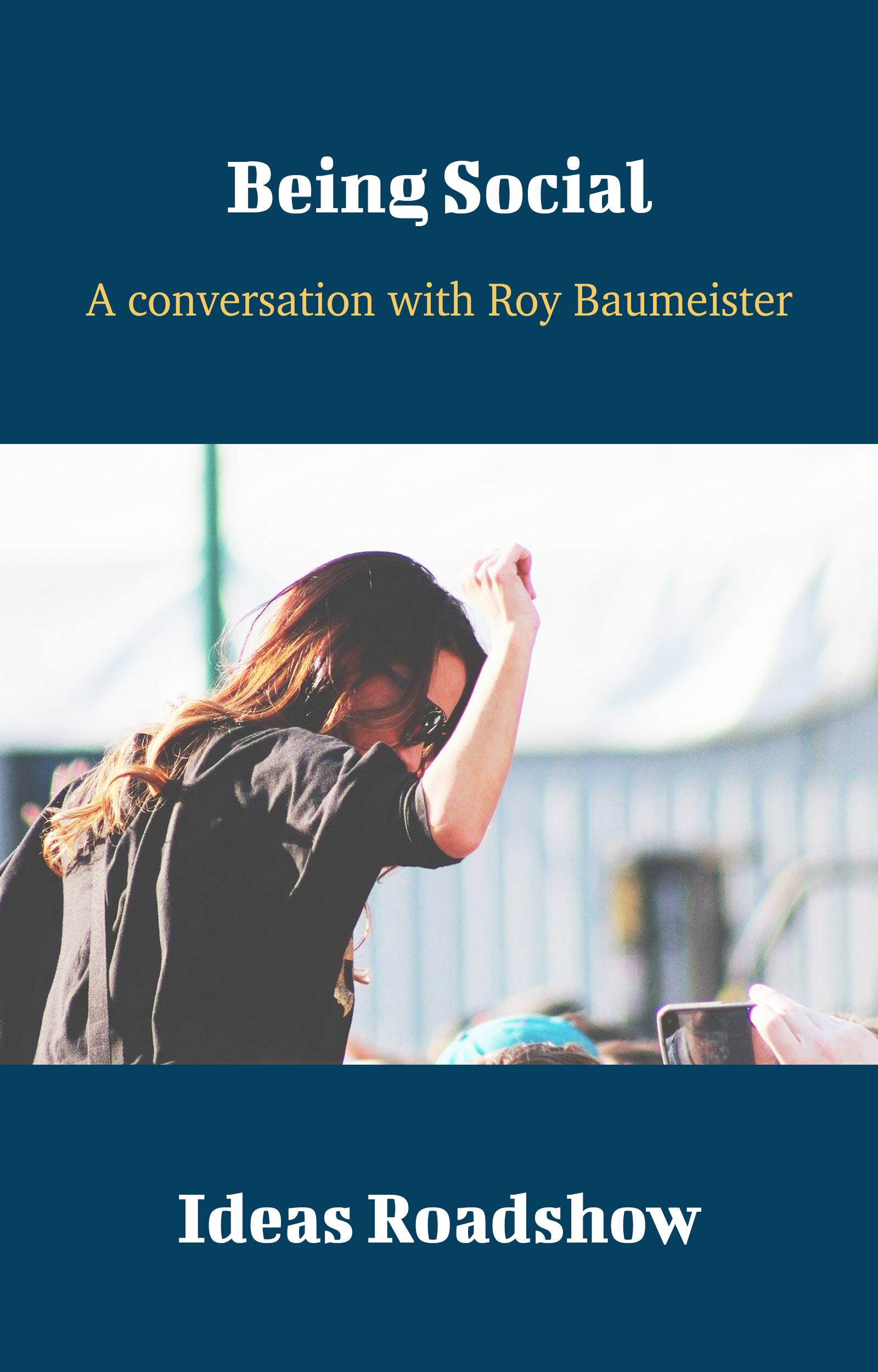The contents of this book are based upon a filmed conversation between Howard Burton and Roy Baumeister in Tallahassee, Florida, on October 31, 2014.
Introduction
The Human Animal
Roy Baumeister is one of the most cited social psychologists around. Which is why when he refers to himself as something of an outsider, its a bit hard to take it seriously. But that doesnt mean it isnt true.
As it happens, Roys sense of disconnect with the prevailing winds of social psychology began very early on in his career, when he was starting his doctorate.
When I was in graduate school, I was reading a lot and trying to absorb the information from the psychological literature. There was a tendency to explain everything as basic processes happening inside the person; and I thought, Well, maybe theres more of an interpersonal dimension going on that people are only really give lip service toafter all, it is social psychology.
There were a lot of discussions of people being concerned about their self-esteem and how theyll react to failure or criticism or success as it depended on their sense of self-esteem.
And I remember thinkingand this ended up being my dissertationWell, maybe people are a little concerned with that but theyre probably a lot more concerned with how other people esteem them.
That dissertation work turned out to be The Need To Belong, his highly influential work with Mark Leary that tangibly demonstrated how our human urge to connect with others had a real, measurable impact on a wide range of measurable aspects of our mental and physical well-being.
Strangely enough, however, despite its success, The Need To Belong hardly changed social psychology in the way that Roy had initially hoped, as by and large the general domain of psychology has had a very difficult time breaking free from its preconceived notions of interpreting human dynamics from an individualistic perspective.
Ive been a bit of a contrarian in social psychology, saying We need to be more social . And indeed, after The Need To Belong, social psychology went a lot more inside the single mind. Most of social psychology is now done by having someone sit behind a computer and make ratings, which is a very solitary activity.
That is clearly ironic, but it is much more besides: a strong refusal to embrace our basic human biology and see the larger picture of the human condition in terms of our driving evolutionary history.
Ive been on this campaign to say, You know, people relate to others; a lot of things are much more interpersonal than weve assumed . There was this general sense that, Well, OK, people interact, but what they do and say to each other is a product of other things going on inside them.
And I tried to turn that around and say, I nner processes serve interpersonal functions: whats going on inside you is there to facilitate relating to others .
Basically, nature doesnt care whats going on inside you and what your self-esteem is or how happy you are or anything like thatit doesnt have any clear effect on your survival or reproduction.
But what other people think of you turns out to be absolutely crucial. For a species like ours, if others dont accept you, youre not going to survive, let alone reproduce.
Seamlessly combining biological and psychological thinking is a hallmark of Roys approach throughout his entire career, from recognizing essential energetic factors involved with willpower and decision-making, to framing free will in evolutionary biological terms, to measuring the numbness associated with social rejection as a form of analgesic response.
Doing so isnt just some form of trendy interdisciplinarityit is nothing less than a way of thinking deeper, placing the human condition in its broadest possible context so as to develop a deeper understanding not just of how individuals make decisions, but how human societies and cultures arise and flourish. Becauseand heres this central point again that strangely needs to be emphasizedhuman beings dont actually live independently from each other. We live in groups.
Like all other animals, we have to solve the problems of survival and reproduction. You need a biological strategyevery living thing has some strategy for doing thatbut ours is a very unusual one as human beings: we create these complex social systems with meaning, with shared information, with interlocking roles and identities and moral obligations and so forth, all of which works very well for us. As a result, we live a lot better than most other creatures, but it needs a lot more psychological capabilities to successfully function in a culture.
So the traits that define us as humanand thats not all the traits, we share many with other animalsthe ones that set us apart are evolutionary adaptations to make possible this new strategy of living in a civilized culture.
Civilization, then, is the natural culmination of psychology and biology.
Well, what else could it possibly be?
The Conversation

I. Psychology, Eventually
Third time lucky
HB: Id like to start by talking a little bit about your background. I understand that you played the guitar. Did you play it for a long time? Was music a big thing in your life?
RB: Yes, my mothers side was musicalshe played the trumpet and she was in some of those little Dixieland bands when she was young. I took trumpet lessons for a while, but when I got braces, it was really hard to sustain, so I stopped.
Then, when I left for college she said, Why dont you just play the guitar? You dont want to waste your musical talent. If you have a guitar you can just lean it up against the wall and grab it every now and thenher point being that trumpet was an instrument you have to play every day in order to keep your mouth muscles strong.
HB: Well, you knew how to read music, obviously; but you had never taken any guitar lessons, up to that point?
RB: No, I had never had any guitar lessons or even really understood the chords and things all that well. But I got a book and taught myself and I practiced pretty assiduously every day for ten yearsI got to be in some bands, nothing very good but it was fun. Once I became a professor, I had to put it aside for a while but a while ago I took it up again. Im getting old nowthe thumbs are starting to get arthritisand I just wondered,









